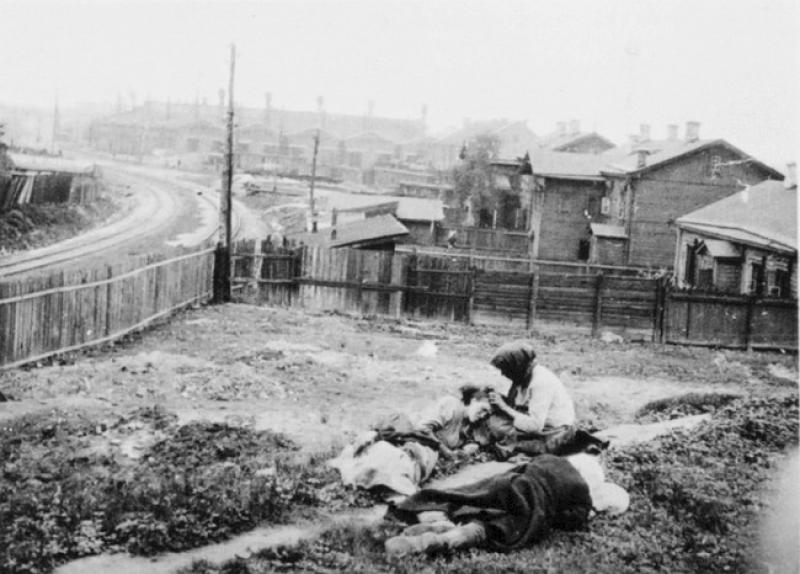Anne Applebaum: Red Famine review - hope around a heart of darkness | reviews, news & interviews
Anne Applebaum: Red Famine review - hope around a heart of darkness
Anne Applebaum: Red Famine review - hope around a heart of darkness
Horrifying detail on Stalin's Ukrainian genocide made bearable by sharp prose

Hands both sensitive and surgical are needed to guide a reader into the heart of the 20th century’s second biggest genocide and out again.
Any single-issue history worth its salt will give us a clear oversight of the general picture, too. Applebaum finds the past in the present, a past that stretches back to Imperial Russian repression of the breadbasket it so condescendingly called “Little Russia” as well as to the chaos of the post-revolutionary civil war, the brief nationalist flourishing of the 1920s and an earlier famine in which Lenin's regime did, albeit belatedly, call upon outside help. In 1932 it was different. Heading towards the heart of darkness, Applebaum gives a cliffhanger intensity to the will-he-won’t-he moment in which Stalin could have conceded failure, or at least flaws, in his policy of forced collectivisation – a desperate enough saga of appropriation which led to another peasant uprising.
 Then you just have to steel yourself for the stomach-churning details of a famine that went from bad to worse even while the USSR was still exporting vital food supplies to pay not just for its defence but also for the insane targets of its five-year industrial plan. There are the results of a new law whereby “the theft of tiny amounts of food…could be punished by ten years in a labour camp”; the brutality and torture inflicted by the collectors upon the peasants – all of whom could acquire the label of “kulak”, a term originally meaning a weathier landowner which had already begun to be indiscriminately applied in 1919; the phases of starvation, unsparingly but never salaciously described, and the cannibalism of parents eating their own children.
Then you just have to steel yourself for the stomach-churning details of a famine that went from bad to worse even while the USSR was still exporting vital food supplies to pay not just for its defence but also for the insane targets of its five-year industrial plan. There are the results of a new law whereby “the theft of tiny amounts of food…could be punished by ten years in a labour camp”; the brutality and torture inflicted by the collectors upon the peasants – all of whom could acquire the label of “kulak”, a term originally meaning a weathier landowner which had already begun to be indiscriminately applied in 1919; the phases of starvation, unsparingly but never salaciously described, and the cannibalism of parents eating their own children.
Unbearable as it is, the essential horror stops with a change of policy. But then there’s the one dimension that makes the Holodomor – derived from the Ukrainian words for “hunger” and “death” – worse than the Nazi holocaust: the forced suppression of the truth. In 1945 a Ukrainian woman who had kept a diary “because after 20 years the children won’t believe what violent methods were used to build socialism” was sent to the Gulag for a decade by the court to which she made this appeal.
 Paradoxically the Nazi occupation of Ukraine had led to several honest reports being published; before that the young Welshman Gareth Jones, who wrote about what he saw travelling off-piste in March 1933, was outgunned by the international Moscow-based press, alarmed at the thought of losing their privileges. Another disgraceful byway of the Holodomor story, in which the much more influential Walter Duranty (“conditions are bad, but there is no famine”) silenced the integrity of Jones, might well be the subject of a screenplay on the theme. Tragically, Jones was murdered by bandits in Mongolia the following year.
Paradoxically the Nazi occupation of Ukraine had led to several honest reports being published; before that the young Welshman Gareth Jones, who wrote about what he saw travelling off-piste in March 1933, was outgunned by the international Moscow-based press, alarmed at the thought of losing their privileges. Another disgraceful byway of the Holodomor story, in which the much more influential Walter Duranty (“conditions are bad, but there is no famine”) silenced the integrity of Jones, might well be the subject of a screenplay on the theme. Tragically, Jones was murdered by bandits in Mongolia the following year.
He could have lived to see his story vindicated in the 1980s. Applebaum is razor-sharp on the path to Ukrainian independence, the role of Chernobyl and Gorbachev’s volte-face on Soviet guilt in 1986, the courage of Yushchenko and the disaster of his succession by the Russian-backed Yanukovych. She is also rightly generous to the scholarship that went before her, with Robert Conquest’s The Harvest of Sorrow leading the way - and also supported, like the publication of Red Famine, by the Harvard Ukrainian Research Institute. In the last few pages, Applebaum does – rightly, I think – let her indignation at the ongoing Russian disinformation campaign colour the picture. But in every respect her research and the beautifully expressd results are worthy of admiration, the book itself irreproachably proofed and well designed. The truth, at last, is here to stay.
- Anne Applebaum's Red Famine is published by Allen Lane
- Read more book reviews on theartsdesk
Add comment
The future of Arts Journalism
You can stop theartsdesk.com closing!
We urgently need financing to survive. Our fundraising drive has thus far raised £49,000 but we need to reach £100,000 or we will be forced to close. Please contribute here: https://gofund.me/c3f6033d
And if you can forward this information to anyone who might assist, we’d be grateful.

Subscribe to theartsdesk.com
Thank you for continuing to read our work on theartsdesk.com. For unlimited access to every article in its entirety, including our archive of more than 15,000 pieces, we're asking for £5 per month or £40 per year. We feel it's a very good deal, and hope you do too.
To take a subscription now simply click here.
And if you're looking for that extra gift for a friend or family member, why not treat them to a theartsdesk.com gift subscription?
more Books
 'We are bowled over!' Thank you for your messages of love and support
Much-appreciated words of commendation from readers and the cultural community
'We are bowled over!' Thank you for your messages of love and support
Much-appreciated words of commendation from readers and the cultural community
 Elizabeth Alker: Everything We Do is Music review - Prokofiev goes pop
A compelling journey into a surprising musical kinship
Elizabeth Alker: Everything We Do is Music review - Prokofiev goes pop
A compelling journey into a surprising musical kinship
 Natalia Ginzburg: The City and the House review - a dying art
Dick Davis renders this analogue love-letter in polyphonic English
Natalia Ginzburg: The City and the House review - a dying art
Dick Davis renders this analogue love-letter in polyphonic English
 Tom Raworth: Cancer review - truthfulness
A 'lost' book reconfirms Raworth’s legacy as one of the great lyric poets
Tom Raworth: Cancer review - truthfulness
A 'lost' book reconfirms Raworth’s legacy as one of the great lyric poets
 Ian Leslie: John and Paul - A Love Story in Songs review - help!
Ian Leslie loses himself in amateur psychology, and fatally misreads The Beatles
Ian Leslie: John and Paul - A Love Story in Songs review - help!
Ian Leslie loses himself in amateur psychology, and fatally misreads The Beatles
 Samuel Arbesman: The Magic of Code review - the spark ages
A wide-eyed take on our digital world can’t quite dispel the dangers
Samuel Arbesman: The Magic of Code review - the spark ages
A wide-eyed take on our digital world can’t quite dispel the dangers
 Zsuzsanna Gahse: Mountainish review - seeking refuge
Notes on danger and dialogue in the shadow of the Swiss Alps
Zsuzsanna Gahse: Mountainish review - seeking refuge
Notes on danger and dialogue in the shadow of the Swiss Alps
 Patrick McGilligan: Woody Allen - A Travesty of a Mockery of a Sham review - New York stories
Fair-minded Woody Allen biography covers all bases
Patrick McGilligan: Woody Allen - A Travesty of a Mockery of a Sham review - New York stories
Fair-minded Woody Allen biography covers all bases
 Howard Amos: Russia Starts Here review - East meets West, via the Pskov region
A journalist looks beyond borders in this searching account of the Russian mind
Howard Amos: Russia Starts Here review - East meets West, via the Pskov region
A journalist looks beyond borders in this searching account of the Russian mind
 Henry Gee: The Decline and Fall of the Human Empire - Why Our Species is on the Edge of Extinction review - survival instincts
A science writer looks to the stars for a way to dodge our impending doom
Henry Gee: The Decline and Fall of the Human Empire - Why Our Species is on the Edge of Extinction review - survival instincts
A science writer looks to the stars for a way to dodge our impending doom
 Jonathan Buckley: One Boat review - a shore thing
Buckley’s 13th novel is a powerful reflection on intimacy and grief
Jonathan Buckley: One Boat review - a shore thing
Buckley’s 13th novel is a powerful reflection on intimacy and grief
 Help to give theartsdesk a future!
Support our GoFundMe appeal
Help to give theartsdesk a future!
Support our GoFundMe appeal

Comments
Anne's "Gulag" was the